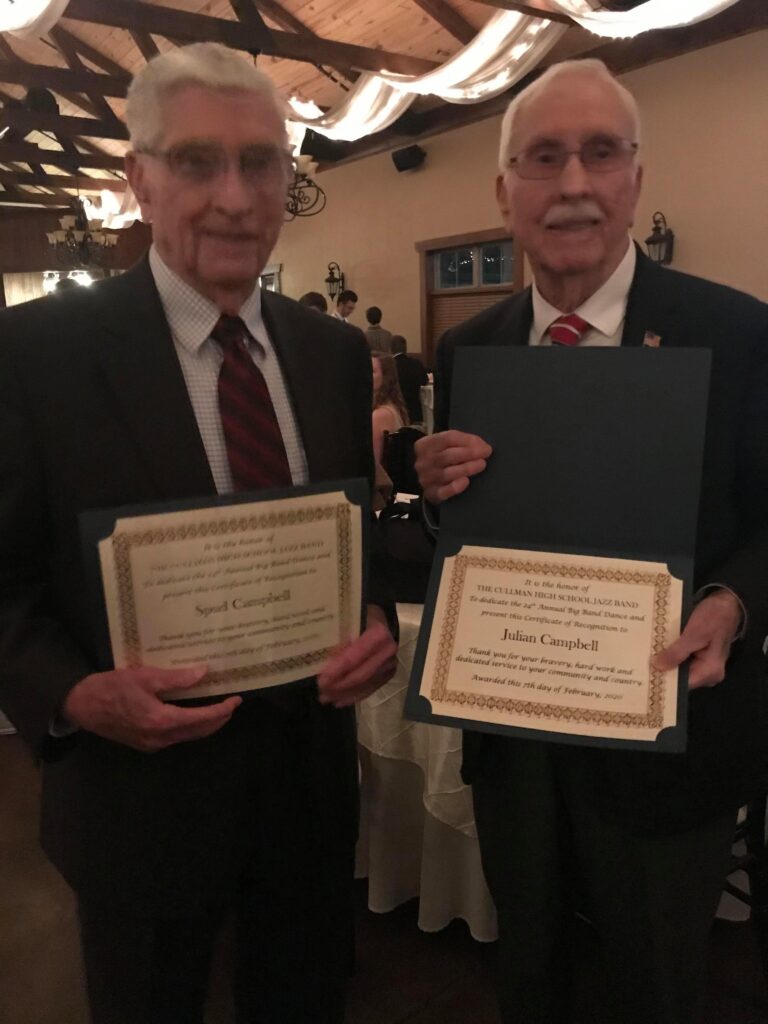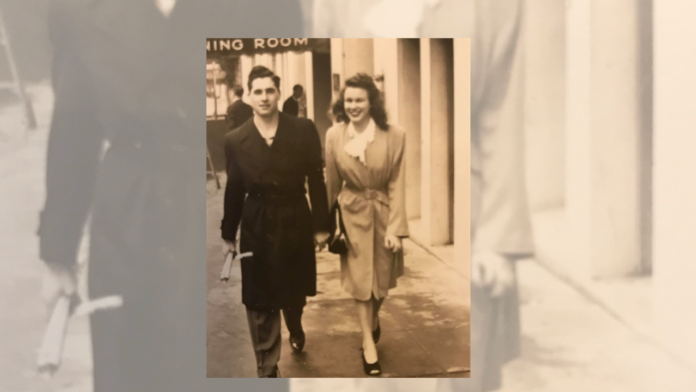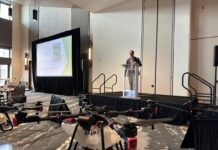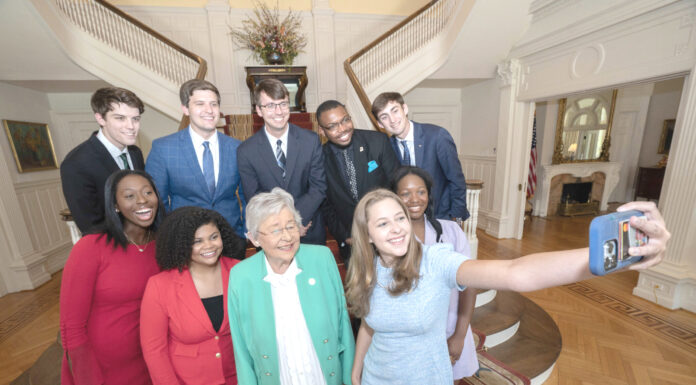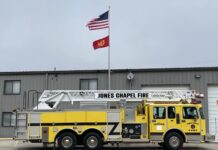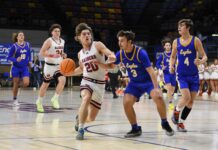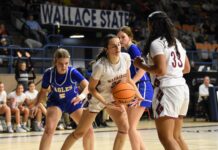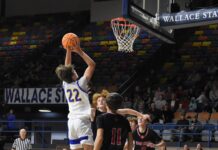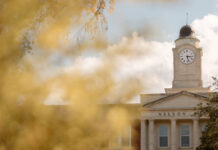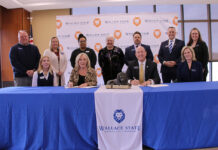On April 13, 2020, Cullman and the world lost one of its greatest heroes when E.S. “Spud” Campbell passed away at the age of 98. His remarkable journey began in Walker County Dec. 28, 1921 and took him all around the world. The young man from Eldridge, Alabama had big dreams, and he certainly achieved them.
Spud was born in Eldridge to Martha Harbison Campbell and George Franklin Campbell. He grew up in Arley and attended Meek High School.
Spud’s son Steve shared, “The whole family, the parents and the 12 children, was only in the same place at the same time one time. That was in 1944, when they all came back to Arley and there was a photograph of the 14 of them- only one time in the whole life of everybody in the family. That was kind of amazing.”
There were six boys and six girls in the Campbell family, including Spud’s older brother, Julian, who recently celebrated his 100th birthday and resides in Cullman.
Spud graduated from Meek High School in 1940 and he was immediately accepted into the U.S. Maritime Service Radio School at Gallops Island in Boston Harbor. He graduated in 1941 and joined the Merchant Marine prior the start of World War II and the attack on Pearl Harbor.
Said Steve, “He got out of high school and decided he had to go see the world.”
After the attack on Pearl Harbor, the Merchant Marine became an instrumental part of the United States’ war effort as it moved crucial supplies to Allies. The Merchant Mariners who served during World War II were civilians and did not gain veteran status until 1988.
Spud served as the first radio officer on the SS Henry Bacon.
Steve explained, “It was one of the Liberty ships and was the one that went up to the Arctic Circle. On the return trip they took on 19 Norwegian refugees on their return trip to Scotland, after they had dropped off all their supplies and war material. I don’t know who made the decisions, but someone decided to part out these refugees that were in Murmansk, Russia to take them back to Scotland. The Russians, they were all starving, and they didn’t need to have more people in their responsibility so they just said, ‘Get them out of here. We are starving already. Get them back to Scotland. That was kind of the way all these refugees got parted out to all the Liberty ships in this convey.”
He continued, “The story I have heard is that there was an unprecedented gale, a storm. It was the middle of February in 1945 up in the Arctic. When they left Murmansk, there was this massive force 12 gale, which is as high as the Beaufort (scale) goes. It’s like hurricane force winds. It was my understanding that the Henry Bacon was damaged in that storm. They lost navigation devices, they lost a life boat, and it sounded like a pretty tough time. When they got past the northern part of Norway and headed south, they were straggling behind the convoy. They couldn’t keep up because of all the damage to the ship.
“I don’t know if this is true, but I have heard that there was an attack by these German torpedo bombers up in the northern part of Norway. I had heard it was the last ship sunk by the German Air Force, the Luftwaffe, in World War II. They had a torpedo attack and it basically hit the Henry Bacon, damaged another life boat and sank the ship. There were only two of the four lifeboats left. When it went down, there was only enough space on the lifeboats for the refugees and fewer than all of the crew of the Henry Bacon. The captain had to make the decision of who was going to go on the lifeboats and who wasn’t. It was obviously a big decision, and he went down with the Bacon himself.”
There were 28 crew who went down with the ship and 42 who survived. All of the refugees were saved and the Norwegian government continues to honor the crew of the Henry Bacon.
The captain decided who would go on the lifeboats based on individual abilities and which would give them the best chance of survival.
Steve said, “That’s what got my dad in one of the lifeboats. He had to erect all of his radio equipment and everything. It was in the middle of the storm. It was dire!”
Spud was able to contact the Royal Navy destroyer HMS Opportune, which led to the rescue.
Steve said, “When I was a kid, I never heard this story. I saw his medal from the King of Norway and I heard a little bit about this, but I never got the whole story until 1994 when the Olympics were in Lillehammer. Whoever was broadcasting the Olympics, they had these little human-interest stories. They had these five-minute stories about Norway and American connections. Somehow, they went to Cullman and talked to my dad. That’s the only reason I got to know this, because of that.”
The next year, 1995, Spud was invited to Norway to commemorate the 50th anniversary of the end of World War II.
“The King and Queen of Norway were there, the Prime Minister was there and my wife and I went with my mom and dad,” said Steve. “We had this wonderful time up in the very north of Norway where these people all came from and everyone there was just treating him like a rock star. It was amazing.”
Before joining the crew of the Henry Bacon, Spud began dating a beautiful girl from Double Springs. His sister introduced him to Bea McCullar and they married March 29, 1945.
“He decided after the whole experience with the sinking and everything, he couldn’t just mess around and wait for life to happen to him; he had to sort of grab it,” said Steve. “He proposed to my mom. He went down on February 23, 1945 and he came back to the U.S. and in March, they were married.”
Spud and Bea lived in San Francisco until after the war and moved back to Alabama in 1946. Their daughter Lynda was born in 1946 and Steve in 1948.
Steve said of his parents, “He always seemed like or had the aura of a movie star. He never took that on. It just sort of happened. He always seemed like he was a self-effacing person, but I heard that all my childhood. People thought he was a movie star and she was quite a looker herself.”
In part two of Spud’s story, Steve will explain Spud’s career in radio and television that led to the family moving to Europe where Spud worked for Radio Free Europe, as well as the Campbells’ return to Cullman.
Copyright 2020 Humble Roots, LLC. All Rights Reserved.
